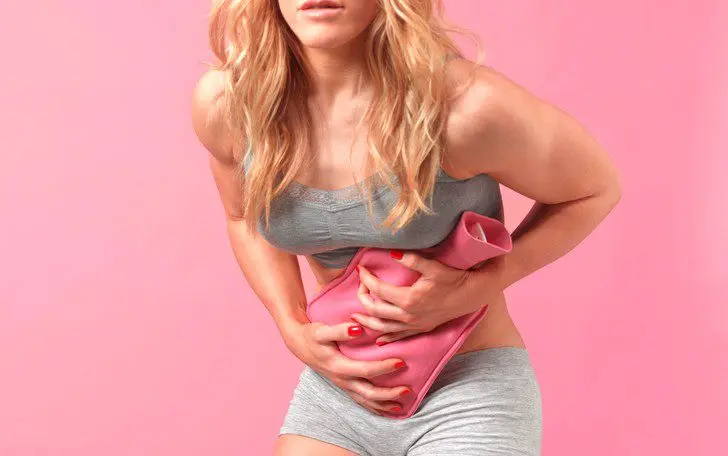Contents
Any little thing during PMS throws a woman out of balance: tears, hysteria and, as a result, someone’s annoyed question: “Do you have your period soon?” Some refer to this phenomenon as a necessary evil. However, you can get rid of PMS.

Premenstrual syndrome (PMS) is a complex of unpleasant symptoms that occurs in women 7-14 days before menstruation.
PMS symptoms are many: from depression, irritability and lethargy to severe headache (migraine), allergic skin reactions, diarrhea or constipation, swelling and tenderness of the mammary glands. Moreover, the signs of PMS and the options for the course are individual for each woman. For example, some have a terrible headache a week before their period, weight increases, and acne appears on their face. While others only 2-3 days before menstruation begin to suffer from depression and insomnia.
Causes
In the premenstrual period, fluctuations in sex hormones occur in a woman’s body – the manifestations of PMS depend directly on the individual response to such fluctuations.
Hormones not only regulate the menstrual cycle, but also “hit” other body systems, for example, the central nervous system, urinary-reproductive system, etc. From here, irritability appears, and slowing down of the kidneys leads to edema. Fortunately, by the time our period begins, everything is back to normal, and we temporarily forget about PMS.
There are other reasons, for example, a lack of vitamins and minerals in the body, the use of large amounts of salt, alcohol, coffee, smoking, a sedentary lifestyle and, of course, stress. So if you feel your PMS periods are getting more difficult, consider your lifestyle. Experts believe that severe PMS can also be inherited.
No. 1. Go to the doctor
Listen to yourself. Try to keep a diary for 4-6 months in which you clearly describe your emotional experiences and physical sensations.
See your gynecologist. Having studied your “mood” the doctor will be able to understand whether it is really PMS, and will help in choosing medications, diet, and tell you about what regimen should be followed in the premenstrual period.
Typically, PMS treatment is done based on the symptoms you are experiencing. There are many drugs for this: sedatives, analgesics and antispasmodics, non-steroidal anti-inflammatory drugs, hormonal drugs, diuretics.
In addition, your doctor may prescribe oral contraceptives, vitamins, and nutritional supplements.
No. 2. Change the diet
Very often, you can get rid of PMS without resorting to medication. To do this, it is enough to refrain from harmful food habits at least 10 – 7 days before the start of menstruation:
Limit the consumption of sugar, salt, coffee, strong tea and do not exceed the required daily amount of liquid – 1,5 liters per day (it is better if it is mineral water and unsweetened juices)! Excessive fluid in the body can lead to painful breast swelling and swelling.
Alcohol is also harmful. It increases hunger, headache, irritability.
Forget about foods that contain artificial additives and flavors.
Beware of large amounts of animal fats, as they are the main source of cholesterol, the excess of which contributes to the disruption of blood circulation. But dishes from fish, poultry or lean beef will come in handy.
Replace butter with vegetable oil. Do not limit yourself to fresh vegetables and fruits, as they contain the necessary vitamins, minerals, fiber. By the way, vitamins of groups A and D improve skin condition and prevent the appearance of acne during PMS. And vitamin E relieves painful sensations in the mammary glands and relieves depression.
# 3. Lead a healthy lifestyle
Sports activities increase the body’s endurance, and this is important in the fight against premenstrual syndrome.
Do not overload the nervous system! Not getting enough sleep only increases irritability and decreases the body’s resistance to stress.
Therefore, take a week break from night work, try to sleep at least 8 hours in a well-ventilated room, and take a contrast shower before bed.
Yoga and breathing exercises are great for PMS headaches. For example, sit in a Turkish position and, gently raising your arms up, take a deep breath. With your arms over your head, hold the air in for a few seconds. Then, slowly lowering your arms, exhale.
# 4. Pamper yourself
If the PMS has nevertheless begun and the eyes are practically on a wet place, then the main thing is to convince yourself that this period will soon pass, but for now you can relax:
Before your period begins, you can arrange a party for yourself, for example, take a warm bath with aromatic oils. Ideally, the essential oil should be selected individually, but the one whose aroma evokes positive emotions in you and allows you to relax is also suitable. There are also universal tips. So, a few drops of cypress, geranium or rose oil added to the bath relieve chest pain. And just 1 drop of sage essential oil or 2 drops of juniper oil relieve swelling.
Almost any spa center has special relaxing and anti-stress programs that will be useful for PMS as well.
№ 5. Grandma’s advice
Lemon balm tea helps to cope with mood swings and insomnia. In addition, lemon balm is also suitable for aromatic baths mixed with other herbs. To prepare a regenerating bath, take 20 g of lemon balm leaves, yarrow, wormwood, oregano, calamus rhizomes, peppermint leaves. Mix all this and cook in a closed container in 10 liters of water, 30 minutes. Then let cool, strain and pour into a hot water bath. The bath time is 15 minutes, at a water temperature of 37 – 38˚С.
With edema, a decoction of horsetail herb helps well: take 30 g of the herb (you can buy it at most pharmacies) and brew it in 1 glass of boiling water. Take 2 – 3 glasses of the broth a day.
Infusion of motherwort herb calms the nervous system. Take 1 tablespoon of finely chopped herbs and boil in 1 glass of boiling water. Take 1 – 2 glasses of infusion per day.









